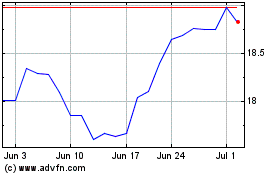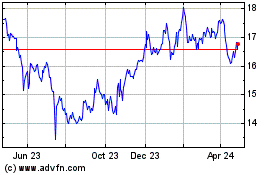AT&T CEO: Time Warner Deal Would 'Disrupt' Cable TV Model
December 06 2016 - 7:28PM
Dow Jones News
By John D. McKinnon
AT&T Inc. Chairman Randall Stephenson plans to tell senators
Wednesday his company's deal with Time Warner Inc. will "disrupt"
the long-established cable TV model in ways that will benefit
consumers, according to his prepared testimony.
"It would be a gross mistake to view this transaction as
anything but pro-competitive," Mr. Stephenson says in his prepared
remarks, adding that the deal will create more competition for
consumers while accelerating the next generation of advanced
wireless broadband.
AT&T and Time Warner executives are preparing to defend
their proposed $85 billion merger Wednesday at a hearing of the
Senate antitrust subcommittee even as they face a rapidly shifting
political landscape buffeted by a wave of angry populism.
Under the proposed deal, AT&T hopes to use Time Warner's
broad array of content, such as HBO, to anchor innovative new video
services such as its online DirecTV Now.
But the merger deal has already raised concerns from the right
and left and taken flak from President-elect Donald Trump, who
criticized it on the campaign trail as too much concentration of
power and promised to block it.
Time Warner chief Jeff Bewkes, in his prepared testimony, will
say the deal would allow his company to continue innovating in
content as well as in consumer experiences, for example by adding
more interactive features to video products.
But the giant deal is likely to face a barrage of questions from
lawmakers, including over its potential impacts on consumers, other
distributors and content producers, as well as over its sheer
size.
The deal would combine AT&T, which has millions of pay-TV
subscribers and wireless customers, with one of the nation's most
prized media content companies. Time Warner includes HBO as well as
the Warner Bros. studios, plus networks including CNN and TNT.
The proposal comes at a time when some lawmakers in both parties
are expressing discomfort with concentration in some industries,
including media and telecommunications.
When Wednesday's hearing was announced, the antitrust
subcommittee's chairman, Sen. Mike Lee (R., Utah), and its top
Democrat, Sen. Amy Klobuchar of Minnesota, issued a joint statement
saying that the deal "would potentially raise significant antitrust
issues" which they promised to "carefully examine."
The deal will be examined at length by antitrust enforcers, and
the senators have no say in their final decision on approving the
deal. Still, the lawmakers can reflect and contribute to the public
mood, which polls -- and election outcomes -- suggest has grown
more populist and anti-big business, as well as anti-big
government, in recent years.
Ms. Klobuchar said in a statement on Tuesday that she is
concerned the deal "could be used to undermine competition at the
distribution level, harm independent providers, and drive up prices
for consumers."
Some lawmakers also are concerned that the deal comes at a time
when big broadband companies such as AT&T are beginning to find
ways around the Obama administration's so-called net neutrality
rules.
Those rules require internet service providers to treat all
content equally, without blocking or slowing. But several
providers, including AT&T, are giving consumers big incentives
to favor some video content by providing it without imposing data
charges.
Write to John D. McKinnon at john.mckinnon@wsj.com
(END) Dow Jones Newswires
December 06, 2016 19:13 ET (00:13 GMT)
Copyright (c) 2016 Dow Jones & Company, Inc.
AT&T (NYSE:T)
Historical Stock Chart
From Mar 2024 to Apr 2024

AT&T (NYSE:T)
Historical Stock Chart
From Apr 2023 to Apr 2024
